Ample Time for Dinner
Short Stories Satisfy, Intrigue, and Entertain
Every so often, another obituary for the short story will appear in print. But, despite the wailing and tears, the form is proving itself surprisingly resilient. Good, even great short fiction is still being written—stories capable of grabbing us by the collar and dragging us into an alternate reality, the scent of which will cling to our clothing and linger in our hair long after we’ve put the book down and microwaved our dinner. Who can ever forget the punch in the gut delivered by Shirley Jackson’s “The Lottery”?
Difficult to master, short stories fall somewhere between the distillation of essence that is a poem and the global narrative possible in a novel, and a side trip into either can be fatal for the form. Their very “shortness” can be problematic, offering a taste that leaves us wanting more and then dropping us cold, or, perhaps worse, allowing for some stupefyingly boring navel gazing. Some authors, knowing the form to be open to experimentation, seem to enjoy watching themselves do intellectual handstands, leaving us feeling perplexed and abandoned.
But the best short stories serve well as vehicles for the expression of things too precious to risk losing in the cavernous halls and labyrinthine passages of the novel, offering “journeys you can make to the far side of the universe and still be back in time for dinner,” in the words of Neil Gaiman.
The authors below, all masters of the form, intrigue, satisfy, and entertain on many levels, and still leave you time to enjoy your dinner.
When You Find Us We Will Be Gone
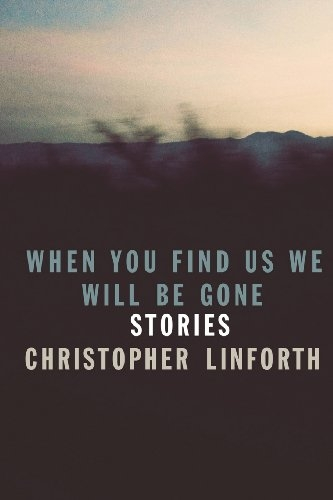
Christopher Linforth
Lamar University Press
Softcover $17.95 (170pp)
978-0-9911074-9-0
The sting of Christopher Linforth’s stories lingers long after the final page. Complex and disturbing, they follow ordinary people caught up in worlds not of their own making, knowing that somewhere (and it’s always somewhere else) there is a better life—a more worthy partner, a brighter future—if only they could get there.
Linforth holds an MFA from Virginia Tech and has been a fellow at the Virginia Center for the Creative Arts and an associate artist at the Atlantic Center for the Arts. He has published fiction in several prominent literary magazines. This powerful debut collection delivers, among other equally poignant tales, a cross-cultural, somewhat touchy, and probably doomed relationship in post-communist Croatia; “cowboys” on a mission to eliminate radioactive cows wandering the outskirts of Fukushima; a young boy who holds the secret of how he lured a predator to his death; a young Jewish girl in a concentration camp who experiences moments of beauty and light when she serves as a model for the camp commander’s painting; and a writer whose identity breakdown leads to his wandering in a no-man’s-land where he can no longer tell his own life from that of his character.
The universal failure of the promise of youth and the unsettling discovery that what is hoped for is really nothing more than a mirage are themes that Linforth handles with intelligence and compassion, bringing his stories uncomfortably close to home.
KRISTINE MORRIS (November 27, 2014)
Our Secret Life in the Movies
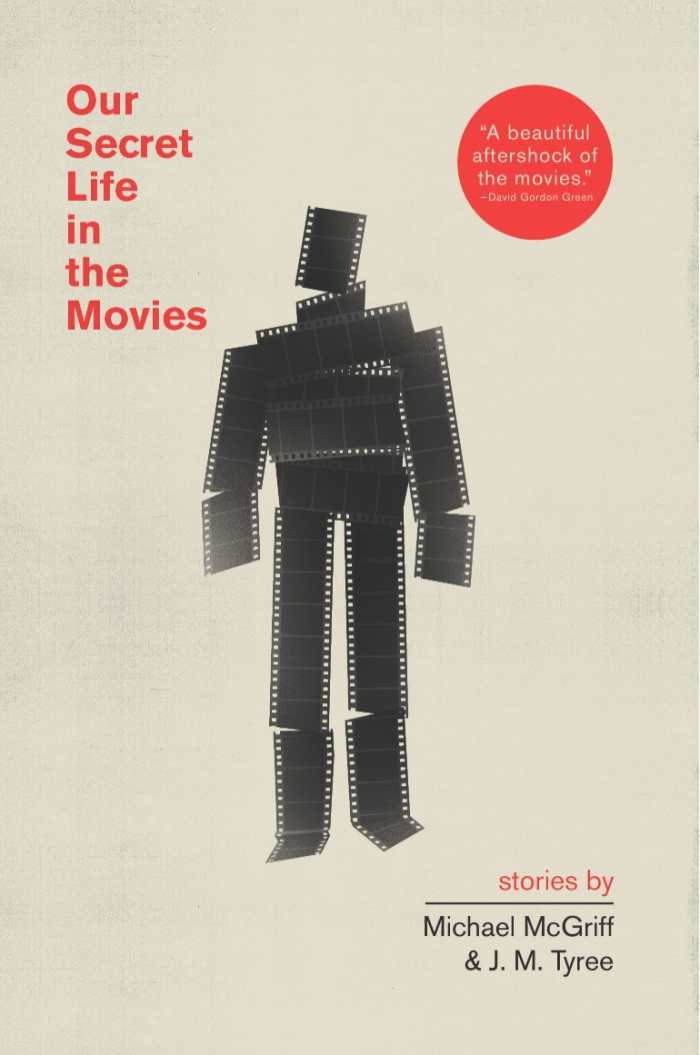
Michael McGriff
J. M. Tyree
A Strange Object
Softcover $14.95 (168pp)
978-0-9892759-6-5
Buy: Local Bookstore (Bookshop)
The decision to watch every film in the Criterion Collection—hundreds of them drawn from cinema classics from all around the world—in a single year led McGriff and Tyree, both published authors, to start writing about the films that had, to some degree, taken over their minds, filling them with powerful images and warping them slightly. The result is a “twinned narrative,” more experimental than autobiographical, a kind of call-and-response playing with the material—if one writer wrote under the inspiration of a film, the other would respond with his own story, like jazz players taking turns with their solos.
As the work grew, rules entered the picture: there had to be one story from each of them for each film, no one would know who wrote what, and the stories had to make sense to someone who had never seen the movies. The result is a collection of linked snapshots of the lives of two young men coming of age in the 1980s, in which the veil that’s supposed to separate the real from the unreal thins and lifts. Our own lives could be the movie, they suggest—and maybe they are.
Michael McGriff is a former Stegner Fellow and Jones Lecturer at Stanford University and a recipient of an NEA grant. J. M. Tyree is a former Truman Capote-Wallace Stegner Fellow in Fiction at Stanford and an associate editor of the New England Review.
KRISTINE MORRIS (November 27, 2014)
Some Extremely Boring Drives
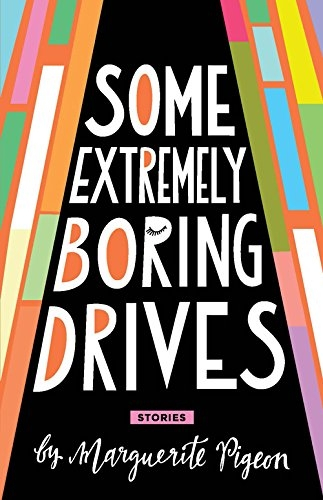
Marguerite Pigeon
NeWest Press
Softcover $19.95 (216pp)
978-1-927063-75-0
Buy: Local Bookstore (Bookshop)
Vancouver, Canada-based Marguerite Pigeon, a former journalist and traveler turned fiction writer and poet, has created a conundrum with the title of this, her newest book—there is nothing boring about this collection of short stories. Pigeon’s characters are all involuntary explorers of outer or inner worlds, who are compelled by their vulnerability to keep moving through places both exotic and mundane. Each, in his or her own way, discovers at least one thing that’s true about adventures: imagined, they can seem glorious; in the middle of them, however, what we call “adventure” is often uncomfortable, smelly, and sometimes downright dangerous.
A competitive athlete in an endurance race in snow-covered Alaska realizes she’s pushed too hard, is losing her mental game, but will not— cannot—quit. A woman, her hair stolen by cancer drugs, realizes she’s not the woman she thought she was. A man catches feral cats for an animal hospital knowing their organs will be used for transplanting into its clients’ ailing pets. A woman encounters her exact double—another “her,” but living a different life. And a woman compelled to move without ceasing is brought to stillness by her father’s death. Driven to extremes, each of Pigeon’s characters is stripped of the coping mechanism that has kept them moving forward; when they’re jolted out of the trance of the ordinary, we don’t know which way they’ll go, or even if they will survive. But one thing is certain—they will never be the same.
KRISTINE MORRIS (November 27, 2014)
I’m Not Scared of You or Anything
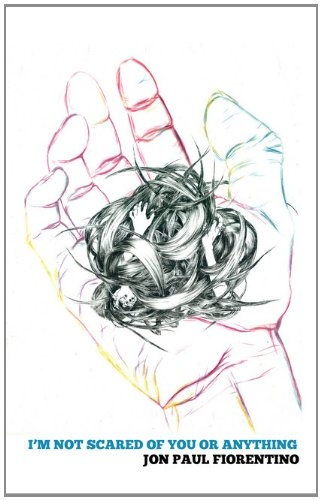
Jon Paul Fiorentino
Maryanna Hardy, illustrator
Anvil Press
Softcover $20.00 (176pp)
978-1-927380-94-9
Award-winning Montreal author, poet, editor, and Concordia University creative-writing instructor Jon Paul Fiorentino writes the thoughts that we all might have, especially those of us who are loners, losers, or social misfits of one sort or another, using them to create surreal little worlds that show what it might be like to actually live them out. How about living as a fake martial-arts expert, a competitive pillow fighter, a busker, or a rock star wannabe from Winnipeg? How about, at the age of thirty-eight, interviewing your own mother and getting her to tell you what she really thought about you as you were growing up—and having her say, “you were a pudgy, pubescent pain in the butt”?
If you’ve ever suspected that the veil between the ordinary and the surreal was very thin—that just a small step to the left would take you to a place where things are not quite what they seem—then these stories, with their touch of absurd humor shrouded in darkness and often hazed over by drugs, drink, or mental illness, may be just what you’re looking for. But be warned: they are not designed for comfort, and their silliness is far more unsettling than funny.
Maryanna Hardy’s quirky illustrations, especially the exquisite cover design, gracefully enhance the dark humor and wit that are amply displayed in this collection. The Montreal artist’s work has been published nationally and internationally, short-listed for several awards, and exhibited in galleries.
KRISTINE MORRIS (November 27, 2014)
Now We Can All Go Home
Three Novellas in Homage to Chekhov
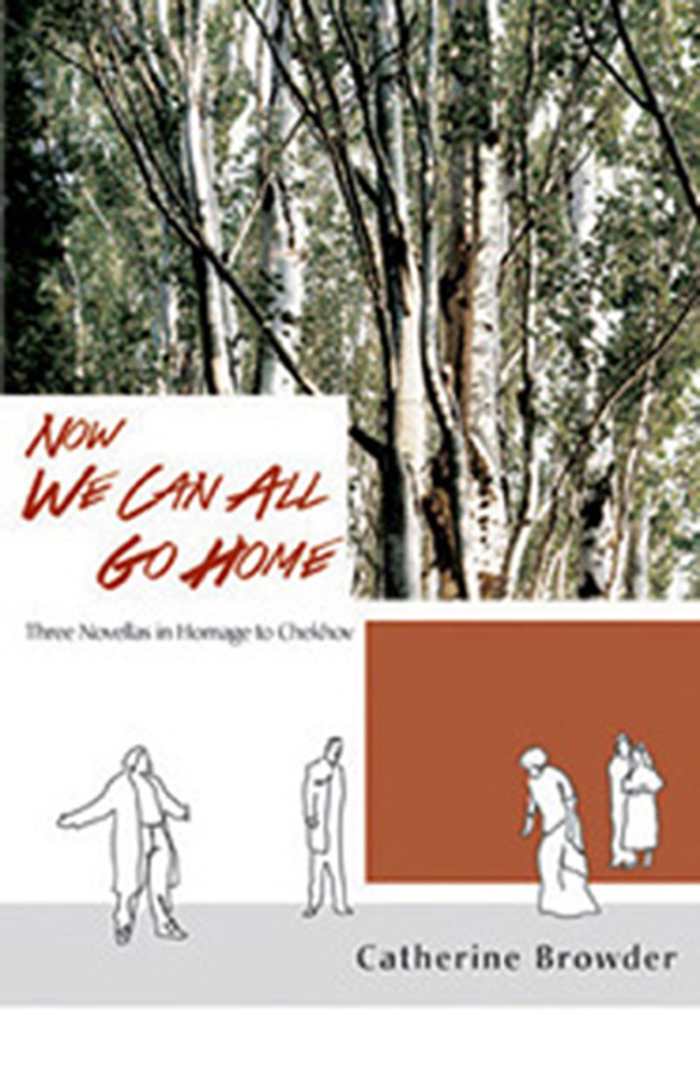
Catherine Browder
BkMk Press
Softcover $15.95 (212pp)
978-1-886157-93-4
Catherine Browder’s Now We Can All Go Home gives lovers of Chekhov’s plays the opportunity to follow some of his beloved characters home after the curtain comes down. In “A Visitor from Kharkóv,” based on Uncle Vanya, Yelena meets a man who puts her longings for Astrov to flight. “Now We can All Go Home” has Irina of The Three Sisters needing to make a new, independent life for herself after her fiancé is killed in a senseless duel. The final story, “Our Side of the Lake,” based on The Seagull, takes place after Kostya has committed suicide, leaving everyone on the estate trying to reevaluate their relationship to him and to each other.
Browder succeeds admirably in capturing the nuances of Russian life as portrayed by Chekhov, and the depth of her understanding of the great playwright’s characters makes her visions of their futures seem inevitable.
The author of three previous fiction collections, the well-traveled Browder is also a playwright and actress who has held an NEA Fellowship in fiction. She has studied at the University of Michigan, the Iowa Writers Workshop, and the University of Missouri-Kansas City, where she also taught. Her work has appeared in several prestigious literary journals.
Her experiment—to allow Chekhov’s characters to live and love long after the theater has gone dark—has resulted in a thoroughly satisfying collection that is a worthy homage to the great Russian playwright.
KRISTINE MORRIS (November 27, 2014)
The Final Death of Rock-and-Roll and Other Stories
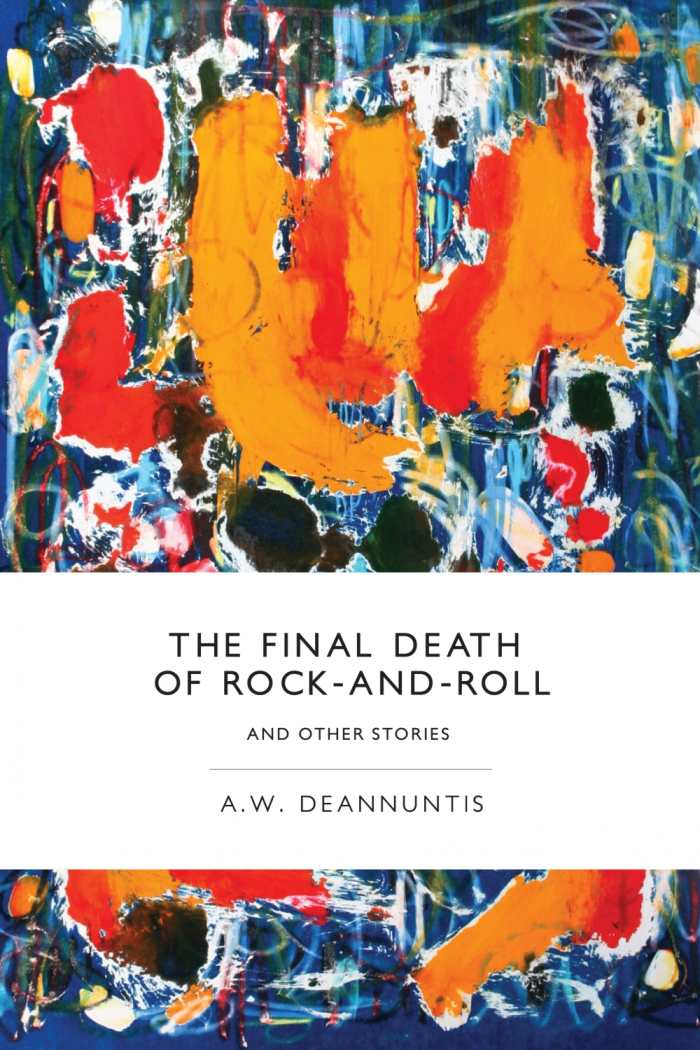
A. W. DeAnnuntis
What Books Press
Softcover $14.95 (181pp)
978-0-9889248-4-0
Buy: Local Bookstore (Bookshop)
A. W. DeAnnuntis wastes no time in bringing on his fantastical situations and odd characters, often setting the stage in the very first sentence: “Our house is actually a clock.” (“At Love in the House of Work”); and, “Once again it’s a different park today, and this is why Peter likes it.” (“The Park of No Return”).
DeAnnuntis takes us on surreal journeys to other worlds that, while looking amazingly similar to the everyday reality we know, are filled with talking dogs, unemployed bears, alien museums, and odd, even uncomfortable visits with Ernest Hemingway (we get way more information than we need to know about the dismal state of his teeth) and Jimi Hendrix, whose death caused the death of rock and roll, necessary for it to “become perfect and eternal.” Everyday situations, like needing to make home or appliance repairs, are handled not by calling a repairman or an electrician, but through the services of a “house psychologist” who tests the home’s electrical and plumbing systems with meters and repairs them by having carefully controlled sex (“To the left…more….Harder…Hurry!”) with the surprised, but not unwilling, homeowner.
DeAnnuntis is the author of two previous novels and has published short fiction in many literary journals. This book is a stunning glimpse into what a marvelous writer can do when he gives free rein to his truly original, quirky mind.
KRISTINE MORRIS (November 27, 2014)
What I Found Out About Her
Stories of Dreaming Americans
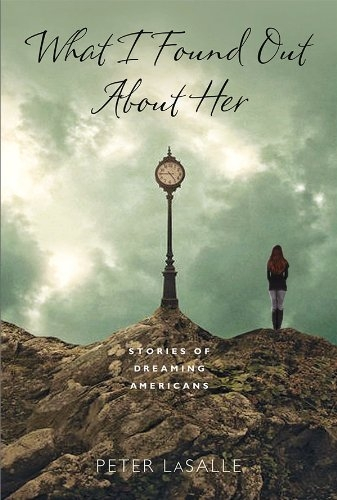
Peter LaSalle
University of Notre Dame Press
Softcover $20.00 (224pp)
978-0-268-03392-7
Buy: Local Bookstore (Bookshop)
Winner of the 2014 Richard Sullivan Prize in Short Fiction, this book, by the Susan Taylor McDaniel Regents Professor of Creative Writing at the University of Texas-Austin, adds to Peter LaSalle’s merited reputation as a writer of powerful and innovative short fiction. LaSalle is a master—his writing is so intelligent and thoughtful, so smooth and fluent, its current so strong, and his characters so easy to care about, even to love, that one forgets to look for the stylistic sleights of hand so admired by academics and instead gets caught up in the lives of people who could easily be one’s best friend, lover, aunt—or oneself.
Questioning how deeply we can ever really know another person, the opening story, which gives its title to the volume, tells of the brief but intense relationship between the narrator and a beautiful young copy editor who later commits suicide, leaving him stunned at how little he had actually known her. While focused on love, loss, and dreams—both the sleeping and waking kind—LaSalle’s tales don’t degenerate into the dreary navel gazing that so often passes for storytelling; instead, he deftly engages us in the things that unite us with his characters: honest emotions evoked by believable events that, over time, may come to feel like a haunting dream. Perhaps, as one of his protagonists says, “The dead are dreaming about us … That’s what being alive is, that’s the easiest way to understand it.”
KRISTINE MORRIS (November 27, 2014)
How to Unfeel the Dead
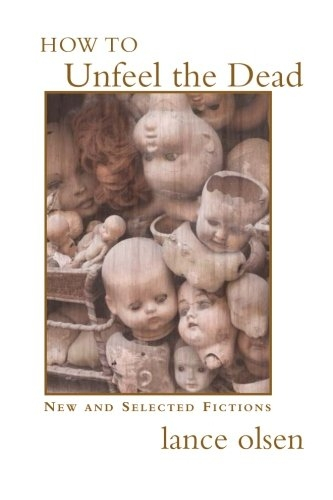
Lance Olsen
Teksteditions
Softcover $22.95 (198pp)
978-1-55128-180-3
Buy: Local Bookstore (Bookshop)
These haunting, even shocking, stories linger in the mind with the power of the shower scene in Hitchcock’s Psycho. Gathered over the span of Lance Olsen’s career, and experimental in style, they run the gamut of odd characters and situations taken to the extreme: a couple’s lovemaking turns to the amputation of body parts; the lobster is viewed as a work of art, a scientific specimen, and a menu item; Jackie Kennedy’s mental state after the assassination of her husband leads to her developing sixteen different personas; a man’s compulsion to care for his neighborhood leads to various disasters; studious attention to a Max Ernst painting becomes a series of hallucinatory experiences; and, a young girl becomes obsessed with kissing frogs to find the one that will turn into a prince. Olsen’s virtuosity is apparent as he explores his characters, their mental states, and the ways their compulsions take over their minds and lives. In taking the opposite of the all-too-common numbed inattention to the extreme, Olsen has unleashed even more horrifying possibilities.
Lance Olsen is the author of more than twenty books and the recipient of Guggenheim and NEA fellowships as well as the Pushcart Prize and the Berlin Prize. He teaches innovative narrative theory and practice at the University of Utah.
KRISTINE MORRIS (November 27, 2014)
Kristine Morris

